
The Kansas–Nebraska Act of 1854 was a territorial organic act that created the territories of Kansas and Nebraska. It was drafted by Democratic Senator Stephen A. Douglas, passed by the 33rd United States Congress, and signed into law by President Franklin Pierce. Douglas introduced the bill intending to open up new lands to develop and facilitate the construction of a transcontinental railroad. However, the Kansas–Nebraska Act effectively repealed the Missouri Compromise of 1820, stoking national tensions over slavery and contributing to a series of armed conflicts known as "Bleeding Kansas."
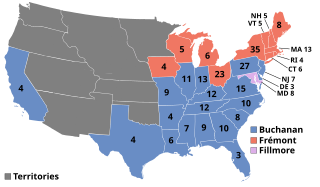
Presidential elections were held in the United States on November 4, 1856. Democratic nominee James Buchanan defeated Republican nominee John C. Frémont and Know Nothing/Whig nominee Millard Fillmore. The main issue was the expansion of slavery as facilitated by the Kansas–Nebraska Act of 1854. Buchanan defeated President Franklin Pierce at the 1856 Democratic National Convention for the nomination. Pierce had become widely unpopular in the North because of his support for the pro-slavery faction in the ongoing civil war in territorial Kansas, and Buchanan, a former Secretary of State, had avoided the divisive debates over the Kansas–Nebraska Act by being in Europe as the Ambassador to the United Kingdom.

Henry Wilson was the 18th vice president of the United States, serving from 1873 until his death in 1875, and a senator from Massachusetts from 1855 to 1873. Before and during the American Civil War, he was a leading Republican, and a strong opponent of slavery. Wilson devoted his energies to the destruction of "Slave Power", the faction of slave owners and their political allies which anti-slavery Americans saw as dominating the country.
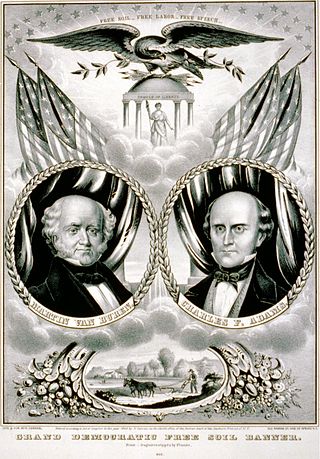
The Free Soil Party, also called the Free Democratic Party or the Free Democracy, was a political party in the United States from 1848 to 1854, when it merged into the Republican Party. The party was focused on opposing the expansion of slavery into the western territories of the United States. The 1848 presidential election took place in the aftermath of the Mexican–American War and debates over the extension of slavery into the Mexican Cession. After the Whig Party and the Democratic Party nominated presidential candidates who were unwilling to rule out the extension of slavery into the Mexican Cession, anti-slavery Democrats and Whigs joined with members of the Liberty Party to form the new Free Soil Party. Running as the Free Soil presidential candidate, former President Martin Van Buren won 10.1 percent of the popular vote, the strongest popular vote performance by a third party up to that point in U.S. history.
The Radical Republicans were a political faction within the Republican Party originating from the party's founding in 1854—some six years before the Civil War—until the Compromise of 1877, which effectively ended Reconstruction. They called themselves "Radicals" because of their goal of immediate, complete, and permanent eradication of slavery in the United States. The Radical faction also included, though, very strong currents of Nativism, anti-Catholicism, and in favor of the Prohibition of alcoholic beverages. These policy goals and the rhetoric in their favor often made it extremely difficult for the Republican Party as a whole to avoid alienating large numbers of American voters of Irish Catholic, German, and other White ethnic backgrounds. In fact, even German-American Freethinkers and Forty-Eighters who, like Hermann Raster, otherwise sympathized with the Radical Republicans' aims, fought them tooth and nail over prohibition. They later became known as "Stalwarts".

Benjamin Franklin "Bluff" Wade was an American lawyer and politician who served as a United States Senator for Ohio from 1851 to 1869. He is known for his leading role among the Radical Republicans. Had the 1868 impeachment of U.S. President Andrew Johnson led to a conviction in the Senate, as president pro tempore of the U.S. Senate, Wade would have become acting president for the remaining nine months of Johnson's term.

The Lincoln–Douglas debates were a series of seven debates in 1858 between Abraham Lincoln, the Republican Party candidate for the United States Senate from Illinois, and incumbent Senator Stephen Douglas, the Democratic Party candidate. Until the Seventeenth Amendment to the United States Constitution, which provides that senators shall be elected by the people of their states, was ratified in 1913, senators were elected by their respective state legislatures, so Lincoln and Douglas were trying to win the votes of the state legislature of the two chambers of the Illinois General Assembly meeting at the state capital town of Springfield for their respective political parties.
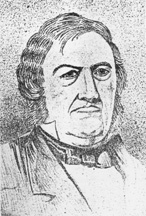
Thomas Morris was an American politician from Ohio who served in the United States Senate and was a member of the Democratic Party. In the 1844 presidential election, he was the vice presidential nominee of the anti-slavery Liberty Party.

Marcus Morton was an American lawyer, jurist, and politician from Taunton, Massachusetts. He served two terms as the governor of Massachusetts and several months as Acting Governor following the death in 1825 of William Eustis. He served for 15 years as an associate justice of the Massachusetts Supreme Judicial Court, all the while running unsuccessfully as a Democrat for governor. He finally won the 1839 election, acquiring exactly the number of votes required for a majority win over Edward Everett. After losing the 1840 and 1841 elections, he was elected in a narrow victory in 1842.
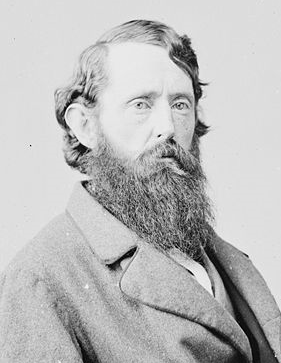
Benjamin Gratz Brown was an American politician. He was a U.S. Senator, the 20th Governor of Missouri, and the Liberal Republican and Democratic Party vice presidential candidate in the presidential election of 1872.

The 1860 Republican National Convention was a presidential nominating convention that met May 16–18 in Chicago, Illinois. It was held to nominate the Republican Party's candidates for president and vice president in the 1860 election. The convention selected former representative Abraham Lincoln of Illinois for president and Senator Hannibal Hamlin of Maine for vice president.
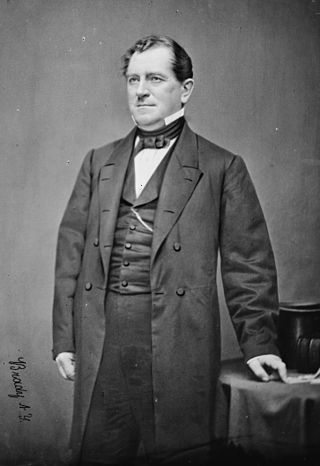
Joshua Reed Giddings was an American attorney, politician and abolitionist. He represented Northeast Ohio in the U.S. House of Representatives from 1838 to 1859. He was at first a member of the Whig Party and was later a Republican, helping found the party.

Stephen Selwyn Harding was an American politician, lawyer, anti-slavery leader and ardent abolitionist in Indiana who served as governor of the Utah Territory (1862–1863) and as chief justice of the Colorado Supreme Court (1863–1865). Because Harding proved to be unpopular with the territory's Mormon leaders and citizens, he remained at Salt Lake City for less than a year before President Abraham Lincoln appointed him to the judgeship at Denver. In 1865 Harding returned to Indiana, where he practiced law until his retirement in 1881. Earlier in his political career, Harding helped organize the Liberty Party in Indiana and was the party's candidate for lieutenant governor of Indiana in 1843 and 1846, but lost both races. Harding subsequently became a member of the Free Soil Party in 1848 and was an early member of the Republican Party in Indiana in the 1850s.

The Slave Power, or Slavocracy, referred to the perceived political power held by American slaveholders in the federal government of the United States during the Antebellum period. Antislavery campaigners charged that this small group of wealthy slaveholders had seized political control of their states and were trying to take over the federal government illegitimately to expand and protect slavery. The claim was later used by the Republican Party that formed in 1854–55 to oppose the expansion of slavery.
The Appeal of the Independent Democrats was a manifesto issued in January 1854, in response to the introduction into the United States Senate of the Kansas–Nebraska Bill. The Appeal was signed by then-prominent American politicians Salmon Chase, Charles Sumner, Joshua Giddings, Edward Wade, Gerrit Smith and Alexander De Witt. Chase and Giddings were concerned that the bill repealed the Missouri Compromise, opening the proposed new territories of Kansas and Nebraska to slavery.
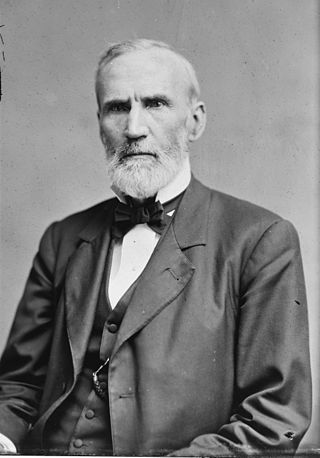
George Washington Julian was a politician, lawyer, and writer from Indiana who served in the United States House of Representatives during the 19th century. A leading opponent of slavery, Julian was the Free Soil Party's candidate for vice president in the 1852 election and was a prominent Radical Republican during the American Civil War and the Reconstruction era.

The Missouri Compromise was federal legislation of the United States that balanced the desires of northern states to prevent the expansion of slavery in the country with those of southern states to expand it. It admitted Missouri as a slave state and Maine as a free state and declared a policy of prohibiting slavery in the remaining Louisiana Purchase lands north of the 36°30′ parallel. The 16th United States Congress passed the legislation on March 3, 1820, and President James Monroe signed it on March 6, 1820.
The Liberty Party was an abolitionist political party in the United States before the American Civil War. The party experienced its greatest activity during the 1840s, while remnants persisted as late as 1860. It supported James G. Birney in the presidential elections of 1840 and 1844. Others who attained prominence as leaders of the Liberty Party included Gerrit Smith, Salmon P. Chase, Henry Highland Garnet, Henry Bibb, and William Goodell. They attempted to work within the federal system created by the United States Constitution to diminish the political influence of the Slave Power and advance the cause of universal emancipation and an integrated, egalitarian society.
This article documents the political career of Abraham Lincoln from the end of his term in the United States House of Representatives in March 1849 to the beginning of his first term as President of the United States in March 1861.

The 1854 Massachusetts gubernatorial election was held on November 15. American Party candidate Henry J. Gardner was elected to his first term as governor, defeating incumbent Whig governor Emory Washburn.















